The Crisis of Rural Despair
The mental health needs of rural America are acute and complex. Last-ditch solutions are on the table. Can they work?
By Sarah Goodyear published January 2, 2018 - last reviewed on April 16, 2019

Nick Cousineau's grandparents settled in Elko, Nevada, as most people did in the early part of the 20th century, with pick-axes in hand and their sights set on gold. Elko sits on the high desert plains in the northeast corner of the state, straddling the Humboldt River and edged by the Ruby Mountains. Interstate 80, one of the country's main thoroughfares, passes through the town, though it's isolated in almost every other respect. Salt Lake City is more than three hours to the east, and Reno is four hours to the west. Gold mines in the nearby hills have sustained families in Elko for generations, although the local economy fluctuates with the price of the precious metal.
Cousineau was gregarious and outgoing, with lots of friends and a reputation among his extended family for infusing life into their holiday gatherings. He relished outdoor activities around Elko—trout fishing, hunting elk and mule deer, camping in the mountains, riding four-wheelers and motorcycles. At 18, he and his 15-year-old girlfriend, Annette, had a baby girl named Skyler and got married. Cousineau joined the Navy and spent three years stationed out of West Virginia, where he learned mechanic skills that proved useful when he returned to Elko and went to work in the mining industry.
Cousineau and his wife had two more children. While some parts of his life seemed to be going well—he had a job and a social network—he had struggled with alcohol since he was a teenager. As he got older, he often exploded in drunken rages and fought with Annette about money. His third DUI offense landed him in prison. He sought help for his drinking now and then, but any progress he made was always undone—a common story in Elko, where a quarter of adults, as well as those in his own family, binge drink. One of his grandmothers had frozen to death in her trailer after passing out drunk.
In late 2009, Cousineau was involved in a motorcycle crash and fractured his temporal bone. He had to be airlifted to Salt Lake City because Elko's small community hospital isn't equipped to deal with severe head injuries. After the wreck, his family says his personality seemed off. He traveled three hours to the nearest veterans' clinic, also in Salt Lake City, and was diagnosed with a brain injury, but no one in his family was told to be on the lookout for possible problems or how to manage them. "We had no idea what was going on," Skyler says. "We just thought: Dad's going crazy."
In early January 2010, during one of their fights, he confronted Annette with a gun. "It only takes one shot," he shouted. She fled the house and called the police, who showed up within a few minutes. By then, Cousineau had put the gun in his mouth and pulled the trigger. He was 38.
Skyler, then 19, was shattered. Along with her mother and brothers, she tried to find counseling in town but, she recalls, the few providers available said they didn't feel comfortable seeing Cousineau's surviving family members because they had previously seen him. Annette turned to pain pills and became addicted. A few years later, one of her sons died of mysterious medical causes, an event that was thought also to be connected to substance abuse.
"It's an epidemic in our community," says Skyler, now 27 and active in local suicide-prevention efforts. "There are so many different factors. We have a heavy prevalence of alcohol, heroin, and meth. We have miners working underground 24 hours a day with no sunlight. There's a lack of resources, and there's a stigma about discussing your issues. It's that old cowboy thing: Buck up and move on."
Nevada ranks last in the country in overall mental health, according to the nonprofit group Mental Health America, which rates the prevalence of mental illness and substance abuse in relation to access to care. A report earlier this year from the University of Nevada, Reno, found that 16 of the state's 17 counties have a severe shortage of mental health professionals. Fourteen are without a single psychiatrist, and a smattering of psychologists and social workers are spread over tens of thousands of square miles. In 2015, the state had the 11th highest suicide rate in the country. From 1981 to 2013, it was number two in suicide by self-inflicted gunshot wound—second only to Wyoming.
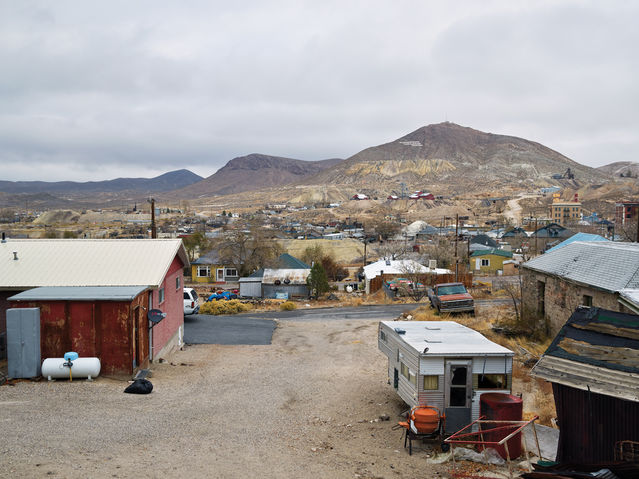
In many ways, Nevada typifies the broader state of mental health in rural America. Since 1999, premature death rates have risen sharply among rural whites; analyses point to marked increases in suicide, drug overdoses, and liver disease, presumably related to alcohol abuse, which collectively were designated "deaths of despair" in a 2015 paper by Princeton economists Anne Case and Angus Deaton. Last year, the Centers for Disease Control reported that both suicide rates and drug overdose rates in rural areas have surpassed those in metropolitan areas. And rural areas everywhere are faced with a chronic lack of access to care.
The problem has been gestating for decades, with complex origins and no simple solutions. "There are mental health problems in urban areas, but they're much worse in rural areas," says Ronald Manderscheid, a researcher at the Johns Hopkins Bloomberg School of Public Health. "If the urban areas have a cold, rural areas have pneumonia."
In 1948, Cornell University psychiatrist Alexander Leighton and his colleagues traveled Canada's maritime province of Nova Scotia to initiate what would become known as the Stirling County Study, a longitudinal study that continues to this day. Parts of the region were in the midst of economic decline, and the researchers found that psychiatric disorders were higher in communities with "broken homes, few and weak associations, inadequate leadership, few recreational activities, hostility and inadequate communication, as well as poverty, secularization, and cultural confusion."
The Stirling County Study is a landmark from the early days of psychiatric epidemiology, when scientists began to look at social determinants of mental health. Many subsequent studies have echoed and elaborated on its key findings. "It's clear from data across the decades that there's a connection between the health of the economy, the health of communities, and the development of mental health problems," says psychologist Peter Keller, a researcher and past president of the National Association for Rural Mental Health.
Keller cautions against painting rural settings with a broad brush. Some are thriving, he says, some are chugging along, and some have creatively reinvented themselves after their former economic base disintegrated. Financial distress also isn't the sole source of psychiatric troubles. But many rural areas that have experienced years of systematic job loss, especially those that were built on manufacturing, have seen a cascade of human damage that can be traced in large part to the economy. In vast swaths of the country, young people face a future without financial stability, let alone upward mobility. Those who are middle-aged are not even treading water. The stressors add up, fostering conditions with grave outcomes.
One is "early trauma, repeated trauma—all sorts of trauma," says Sean Dodge, a psychologist who runs the state mental health office in Gardnerville, a farming community in western Nevada. Dodge's clients live in the shadow of the Sierra Nevada mountains and come to him with pervasive, chronic, and often debilitating problems. "It's rare for me to see someone who has not been abused. Almost every one of my clients was raised in poverty in an insecure home with inconsistent parenting and inconsistent access to food or education. I've come to the conclusion that we're not so much treating mental illness as we're treating poverty."
His observations dovetail with research showing that rural children are more likely than their urban counterparts to have had one or more adverse childhood experiences—traumas such as physical, sexual, and emotional abuse or neglect, whose harmful effects can stretch into adulthood. More than 70 percent of children in small towns and isolated rural areas have been exposed to more than one adverse childhood experience.
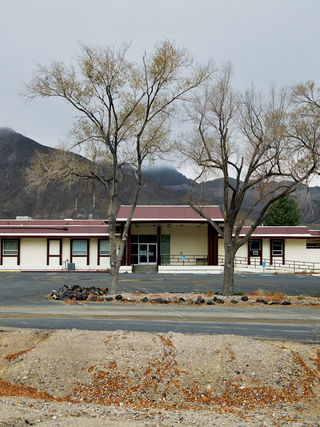
Paradoxically, the economic decline that fuels the need for mental health care in remote settings simultaneously reduces its availability. Without good jobs, people tend not to have the kind of health-care coverage that would pay for such help, and many predominantly rural states refused the Medicaid expansion under the Affordable Care Act that might have made it available. Of those who do have jobs, a large proportion are self-employed or work for small businesses that do not offer health insurance.
Deep-seated cultural mores also play a part. An emphasis on independence and fending for oneself prevents people from seeking help even if it is available. Likewise, there's an imperative to avoid shame in tight-knit places where everybody tends to know everyone else's business. "If you pull up at the office of a local mental health provider, the community knows why you're there," says Dennis Mohatt, a behavioral health executive at the Western Interstate Commission for Higher Education.
Along with high suicide rates, the opioid scourge is a banner manifestation of the problem. There's hardly a corner of the country that hasn't been touched by opioid addiction, which caused more than 64,000 deaths nationwide in 2016, a 21 percent increase over the previous year. Rural areas have been particularly gutted. Economic pain isn't completely to blame: Among the many reasons that researchers cite are the far greater prescription rates of narcotic painkillers in rural settings, strong kinship networks that ironically help the drugs spread easily from person to person, and relatively long emergency response times when overdoses do occur.
But a depressed economy is certainly a factor. "The vulnerability is huge," says J. Dennis Murray, a psychologist at Mansfield University in Pennsylvania who has studied rural mental health for more than 30 years. "My simplistic view is that if people's lives are going well and they have a future orientation, with goals and hope, they're not going to be as desperate and as prone to problems with drugs and alcohol. For a lot of these folks, life is not going well."
And while rural mental health has been deteriorating for a long time, Keller says, "it's now affecting national politics in a way that it never has before." In the time since Donald Trump was elected president in 2016, carrying rural areas by decisive margins, Shannon Monnat, a sociologist and rural demographer at Pennsylvania State University, has looked at county-level mortality due to drugs, alcohol, and suicide and at support for Trump. The rates show an uncanny correlation.
Monnat clarifies that this doesn't imply causation and that no one factor can account for Trump's victory. Still, she wrote in a Penn State research brief, "At the core of increasingly common 'deaths of despair' is a desire to escape—escape pain, stress, anxiety, shame, and hopelessness. Drug and alcohol disorders and suicides are occurring within a larger context of people and places desperate for change. Trump promised change."
Peter Keller, the rural mental health researcher, is "not surprised that people in these situations voted for Donald Trump. It looked like a sign of hope in a sea of despair." That hope itself appears to be dimming. In a Reuters poll released in October, support for Trump among rural Americans had slipped from 55 percent at the time of his inauguration a year ago to 47 percent—still much higher than among other groups, but a significant drop for a population that was instrumental to his win.
If Heather Singleton sees a stranger walking along the highway around Tonopah, a rundown desert town in western Nevada, she stops to give him a ride, or at least to offer a bottle of water. She keeps a 24-pack in her car just in case. "I'm a helper bee," she says.
Singleton is the only full-time employee at the only state-run mental and behavioral health clinic in Tonopah, situated on a 210-mile stretch of two-lane highway that's interrupted by little more than sagebrush. The town is in official Frontier Country, a designation one step down from rural in population density. For the 10,000 people scattered within an hour or two, it's the one place to go for food, gas, or services of any kind. It's also the one place to go for help if you're depressed and thinking of ending it all, or if your kid is hearing voices and acting out, or if your anxiety is so bad you don't know how to make it through the day without getting high. In those cases, Singleton is there, ready to assist whoever walks through the door.
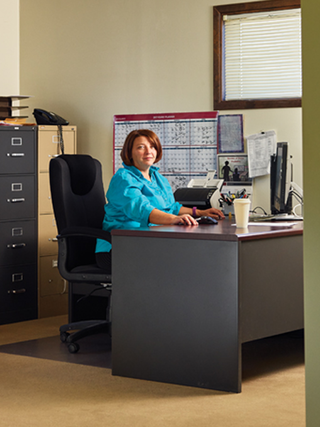
With a sun-weathered face and a warm grin that crinkles the corners of her eyes, Singleton, a Nevada native, took classes at a local community college to qualify as a mental health technician, a job that entails caring for people with mental illness—observing their behavior, monitoring their medication schedule, and helping with their hygiene and other daily life activities. There are certifications available for the job, which pays a median of $13 an hour, though most states don't require a license. From Singleton's spartan office, in a double-wide trailer on a back street in town, she spends her days filling out paperwork for clients, pounding the phones to find placements in substance-abuse programs, and figuring out creative ways to get their medicine paid for. She drives to their homes to prod them to exercise, make sure they have food, and remind them of doctor appointments.
For three years, one of the beneficiaries of Singleton's tireless effort has been Crystal, a mother of three who moved to Tonopah from Nashville because of her husband's job. Crystal arrived in the town with a history of rapidly cycling bipolar disorder that's hospitalized her in the past. In Tonopah there are almost no resources to help her condition. There are no psychologists, no psychiatrists. The local hospital closed in 2015, leaving an enormous area without even an emergency room. There is just the bare-bones clinic where Singleton holds down the fort.
Once a month, Crystal sees a therapist who comes to town for the day. Every three months, she has a video appointment with a psychiatrist in Reno whom she's never met in person. The transition to such a meager degree of care has been tough. "It certainly doesn't help my mental health," she says. Last fall, when she felt a manic episode coming on, it was Singleton she conferred with, Singleton who drove three hours with her to a hospital in Las Vegas, and Singleton who created a detailed re-entry plan after she was stabilized and discharged. "She does it just because she cares," Crystal says.
Singleton loves the gratification of helping people, yet it pains her that she's the only one who seems to care. She recalls once making special arrangements for a psychiatrist to come to town to meet some of her far-flung clients for appointments. "My clients came from Silver Peak, Goldfield, Round Mountain—one drove 64 miles," she says. "The doctor didn't show up. No show, no call. I left bawling, I was so devastated. We have no safety net in Tonopah. We just fall."
Funding is a problem. Nevada has no income tax and instead relies on revenue generated by the gaming and tourism industries. Governor Brian Sandoval, a Republican, built his 2010 campaign on a promise to freeze taxes and slash state spending. The state mental health budget was cut 28 percent by 2012. "If you want low taxes, you're not getting services," Ginger Bevilacqua Paulsen, the executive director of
Nevada's chapter of the National Association of Mental Illness, says bluntly. "You get what you pay for."
The squeeze is felt all around. Like the one that used to be in Tonopah, rural hospitals are closing everywhere. Since 2010, 82 across the U.S. have shut their doors. Some primary-care providers offer mental health care, but they're hard to find in many remote communities and even harder to get appointments with. For decades, experts have been pointing to the critical shortage of mental health professionals. Psychiatrists and psychologists either can't or simply don't want to work there.
"Unless it happens to be a beautiful seaside community or ski area, there's a real difficulty attracting and retaining trained mental health professionals in rural communities," Keller says. "That's complicated by the fact that when you do attract them, their workloads rise dramatically. Not to mention that income levels tend to be lower, which makes it harder to sustain a living."
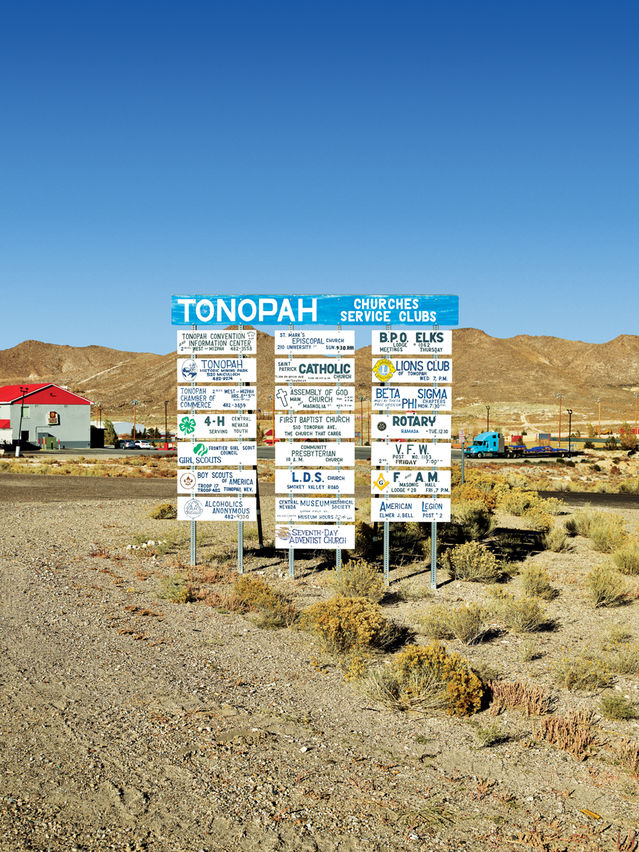
And the hometown sons and daughters of these areas who could potentially make a difference—in terms of mental health or anything, really—tend not to stick around."Kids who are capable of following the economy go to college and leave," Murray says. "Those who are left behind aren't the best at helping the next generation. So you get this spiral of problems and a substrate of folks who are just stuck."
'Geography shouldn't mean you're any less of a person, but somehow that's how it plays out," says Tina Gerber-Winn, director of rural clinics for the state of Nevada. Hanging in her Carson City office is a large state map, the challenge of geography plainly evident. The agency's clinics are marked with little dots—Yerington, Hawthorne, Winnemucca, Lovelock—surrounded by gaping empty stretches. There is no easy way to bridge those distances, but she's working on it.
Gerber-Winn is pushing for metropolitan therapists to travel more frequently to rural communities. She's lobbying for mobile crisis units to be permanently situated in far-flung areas. She's trying to get rural towns to advocate for themselves at the state level, with the recognition that each place has unique needs that are best understood by the people who live there. And she's brought in a program that sponsors residencies in rural communities for clinical psychology students. The program, piloted in Alaska and expanded to Oregon and Hawaii as well as Nevada, is built on the idea that people trained in rural settings are more likely to take a shine to them and put down roots. In Alaska, Hawaii, and Nevada, up to 70 percent of the student psychologists have chosen to remain where they interned.
Innovative solutions are cropping up all across rural America. One effort trains rural residents themselves as mental health paraprofessionals or peer-support specialists. They are people who typically have had their own experience of living with and recovering from a mental illness and who counsel, advise, and assist others experiencing the same condition. One such program in Alaska, which has the second highest suicide rate in the country, trains indigenous people in remote villages to help their own community's members in culturally sensitive ways. The movement to train and hire peer-support specialists is growing rapidly: Mental Health America created the first national peer specialist certification last year, and 35 states now pay for peer services through Medicaid. Studies have shown that peer specialists can be as effective as trained case workers at keeping people who suffer from serious mental illness out of psychiatric hospitals and engaged in outpatient care.
From his vantage point in the Pennsylvania countryside, Murray sees the peer-support model gaining steam although the specialists are paid, he says, "poverty wages—it's what I call missionary work." Still, the role can fulfill needs that don't necessarily require someone with years of higher education. "If you have someone patients can see when they're in crisis, who can guide them to services, whether it's transportation or home-heating support, that might help with their problems," Murray says. "It's certainly a way to give people assistance so they're not feeling so desperate."
Another major focus is telemedicine, which refers broadly to health care delivered via technology. Its application in rural settings has expanded over the past 10 years, and some studies have shown it to be effective. A 2016 review of telepsychiatry outcomes published in the World Journal of Psychiatry shows that psychiatric services delivered by video conference are comparable to those delivered in person in terms of diagnosis and treatment outcomes. But the review also reported providers' concerns about impairment of therapeutic rapport. Murray cautions that the outcome data on telepsychiatry's effectiveness are still limited, and that this approach requires a level of access and capability that cannot be assumed of rural residents: Broadband Internet service is far too expensive for many people, if it's even available. Also, telepsychiatry costs money that anemic state budgets, weak insurance, and tenuous Medicaid cannot be counted on to provide.
Despite all the efforts to help people living in rural communities address their discouragement and despair, many feel like band-aid solutions that don't address the underlying problem—economic conditions that ripple through every facet of life.
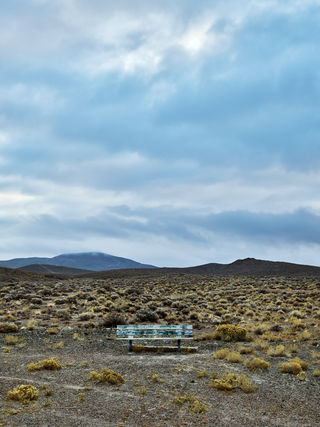
"What's the solution?" Keller asks. "I don't have a good answer. The solution in part is coming to grips with the idea that many rural communities aren't going to be there in the future. All you have to do is drive through West Virginia to see that the decline is massive and nothing can save the area. No number of psychotherapists can solve these problems. The challenge we face is helping rural communities adjust to a world that is never again going to be like it was."
People like Heather Singleton, committed to the rural way of life and steeped in the frontier tradition of self-reliance, say they see the challenge and are ready to face it. "I like being there for my clients," she says. "Getting their medications, getting them to a therapist if they need help. It's our community, it's our problem, and we have to fix it."
Submit your response to this story to letters@psychologytoday.com. If you would like us to consider your letter for publication, please include your name, city, and state. Letters may be edited for length and clarity.
Pick up a copy of Psychology Today on newsstands now or subscribe to read the the rest of the latest issue.
LinkedIn image: Dmitrijs Dmitrijevs/Shutterstock
